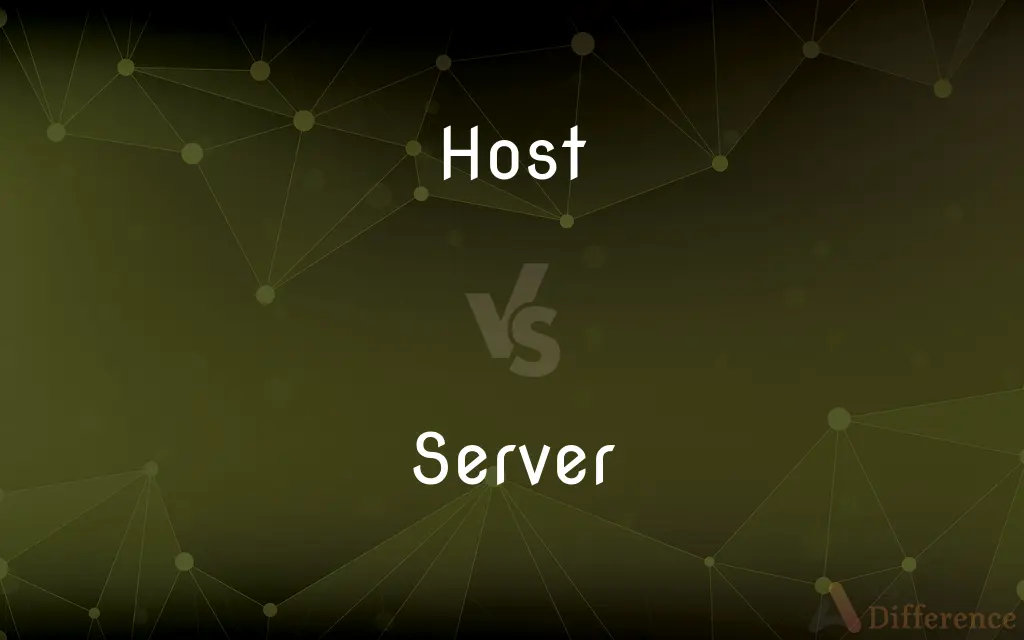Host vs. Server — What's the Difference?
By Tayyaba Rehman — Updated on September 23, 2023
A host is any device connected to a network, while a server is a specialized host that provides services or resources. Both are integral in network communication.

Difference Between Host and Server
Table of Contents
ADVERTISEMENT
Key Differences
A host, in the realm of computer networking, refers to any device that communicates with other devices on a network. This means that desktop computers, laptops, smartphones, and even printers can be considered hosts. Essentially, a host is a participant in network communications, equipped with its own unique IP address to identify it in the network.
On the contrary, a server is a particular type of host. It's a system designed to provide resources, data, services, or programs to other computers, known as clients, over a network. Servers often have specialized hardware and software that allow them to serve numerous clients simultaneously, making them efficient and vital for many organizational tasks.
In essence, while all servers are hosts, not all hosts are servers. A personal laptop connected to the internet can be a host but isn't necessarily a server unless it's specifically set up to provide resources or services to other devices. Servers generally have a designated function, whether it's hosting websites, managing emails, or storing files.
Moreover, the server's functionality is often indicated by its name: for instance, a web server hosts websites, while a file server stores files. Hosts, being a broader category, encompass a wide range of devices, from personal gadgets to large-scale servers.
The language of "host" and "server" permeates discussions about computer networks. Grasping their distinction is pivotal in understanding how data moves and is accessed on networks, with hosts being general participants and servers as specialized providers.
ADVERTISEMENT
Comparison Chart
Definition
Any device on a network.
A specialized host providing services or resources.
Role
Participant in network communication.
Provider of specific resources or services.
Examples
Computers, smartphones, tablets.
Web servers, email servers, file servers.
Hardware Requirement
Standard hardware for connectivity.
Often specialized for high performance and multiple clients.
Functionality
General; no specific function other than connectivity.
Designated, based on the type of service provided.
Compare with Definitions
Host
An organism in which another lives.
The human body can be a host to many bacteria.
Server
Hardware designed to handle multiple client requests.
Their powerful server could handle thousands of simultaneous connections.
Host
A person who entertains guests.
She was a gracious host at the dinner party.
Server
A person serving food in a restaurant.
The server brought our meals promptly.
Host
A company providing internet services.
The startup chose a reliable web host for their website.
Server
A computer program managing database access.
The database server ensures data integrity and security.
Host
One who receives or entertains guests in a social or official capacity.
Server
One who serves food and drink. See Usage Note at waiter.
Host
A person who manages an inn or hotel.
Server
Something, such as a tray, that is used in serving food and drink.
Host
One that furnishes facilities and resources for a function or event
The city chosen as host for the Olympic Games.
Server
An altar server.
Host
The emcee or interviewer on a radio or television program.
Server
(Law) One who serves a legal process, such as a summons or court order.
Host
An organism on which or in which another organism lives.
Server
(Sports) The player who serves, as in court games.
Host
A cell that has been infected by a virus or other infective agent.
Server
A file server.
Host
(Medicine) The recipient of a transplanted tissue or organ.
Server
A computer that processes requests for HTML and other documents that are components of webpages.
Host
A computer or other device providing data or services that a remote computer can access by means of a network or modem.
Server
(computing) A program that provides services to other programs or devices, either in the same computer or over a computer network.
Host
A computer that is connected to a TCP/IP network such as the internet.
Server
(computing) A computer dedicated to running such programs.
Host
An army.
Server
One who serves.
Host
A great number; a multitude.
Server
A waitress or waiter.
Host
The consecrated bread or wafer of the Eucharist.
Server
The player who serves the ball.
Host
To serve as host to or at
"the garden party he had hosted last spring" (Saturday Review).
Server
(Christianity) A priest's attendant at the celebration of the Eucharist.
Host
To provide software that offers data or services, hardware, or both over a computer network.
Server
A tray for dishes.
Host
One which receives or entertains a guest, socially, commercially, or officially.
A good host is always considerate of the guest’s needs.
Server
A spoon for serving food.
Host
One that provides a facility for an event.
Server
One who serves.
Host
A person or organization responsible for running an event.
Our company is host of the annual conference this year.
Server
A tray for dishes; a salver.
Host
A moderator or master of ceremonies for a performance.
The host was terrible, but the acts themselves were good.
Server
A person whose occupation is to serve at table (as in a restaurant)
Host
Any computer attached to a network.
Server
(court games) the player who serves to start a point
Host
(ecology) A cell or organism which harbors another organism or biological entity, usually a parasite.
Viruses depend on the host that they infect in order to be able to reproduce.
Server
(computer science) a computer that provides client stations with access to files and printers as shared resources to a computer network
Host
An organism bearing certain genetic material, with respect to its cells.
The so-called junk DNA is known, so far, to provide no apparent benefit to its host.
Server
Utensil used in serving food or drink
Host
A paid male companion offering conversation and in some cases sex, as in certain types of bar in Japan.
Server
A system offering resources over a network.
The company set up a new server to handle the increased web traffic.
Host
A multitude of people arrayed as an army; used also in religious senses, as: Heavenly host (of angels)
Server
A system storing and delivering web content.
The web server hosts several e-commerce sites.
Host
A large number of items; a large inventory.
The dealer stocks a host of parts for my Model A.
Host
(Christianity) The consecrated bread of the Eucharist.
Host
To perform the role of a host.
Our company will host the annual conference this year.
I was terrible at hosting that show.
I’ll be hosting tonight. I hope I’m not terrible.
Host
To lodge at an inn.
Host
To run software made available to a remote user or process.
Kremvax hosts a variety of services.
Host
The consecrated wafer, believed to be the body of Christ, which in the Mass is offered as a sacrifice; also, the bread before consecration.
Host
An army; a number of men gathered for war.
A host so great as covered all the field.
Host
Any great number or multitude; a throng.
And suddenly there was with the angel a multitude of the heavenly host praising God.
All at once I saw a crowd,A host, of golden daffodils.
Host
One who receives or entertains another, whether gratuitously or for compensation; one from whom another receives food, lodging, or entertainment; a landlord.
Time is like a fashionable host,That slightly shakes his parting guest by the hand.
Host
Any animal or plant affording lodgment or subsistence to a parasitic or commensal organism. Thus a tree is a host of an air plant growing upon it.
Host
To give entertainment to.
Host
To lodge at an inn; to take up entertainment.
Host
A person who invites guests to a social event (such as a party in his or her own home) and who is responsible for them while they are there
Host
A vast multitude
Host
An animal or plant that nourishes and supports a parasite; the host does not benefit and is often harmed by the association
Host
A person who acts as host at formal occasions (makes an introductory speech and introduces other speakers)
Host
Archaic terms for army
Host
Any organization that provides resources and facilities for a function or event;
Atlanta was chosen to be host for the Olympic Games
Host
(medicine) recipient of transplanted tissue or organ from a donor
Host
The owner or manager of an inn
Host
A technical name for the bread used in the service of Mass or Holy Communion
Host
(computer science) a computer that provides client stations with access to files and printers as shared resources to a computer network
Host
Be the host of or for;
We hosted 4 couples last night
Host
A device connected to a network.
Every computer on the local network acts as a host.
Host
A main broadcaster or presenter on a show.
The host introduced the next segment with enthusiasm.
Common Curiosities
Do hosts always need the internet?
No, hosts can be part of smaller, local networks without internet connectivity.
Are there different types of servers?
Yes, including web servers, file servers, database servers, and more.
Can my personal laptop act as a server?
Yes, if it's set up to provide resources or services, it can function as a server.
Is a server always a physical machine?
No, there are virtual servers that run on shared physical hardware.
Is every computer a host?
Yes, every computer connected to a network acts as a host.
What's a primary function of a server?
A server provides specific resources or services to clients over a network.
Can one device be both a host and a server?
Yes, any server is inherently a host, but not every host is a server.
What does a web host do?
A web host provides the infrastructure to publish websites on the internet.
What is the relationship between a client and a server?
Clients request resources or services, and servers provide them.
Can hosts communicate directly with each other?
Yes, in peer-to-peer networks, hosts can communicate without a central server.
Share Your Discovery

Previous Comparison
Cardboard vs. Card
Next Comparison
Ferret vs. WeaselAuthor Spotlight
Written by
Tayyaba RehmanTayyaba Rehman is a distinguished writer, currently serving as a primary contributor to askdifference.com. As a researcher in semantics and etymology, Tayyaba's passion for the complexity of languages and their distinctions has found a perfect home on the platform. Tayyaba delves into the intricacies of language, distinguishing between commonly confused words and phrases, thereby providing clarity for readers worldwide.














































